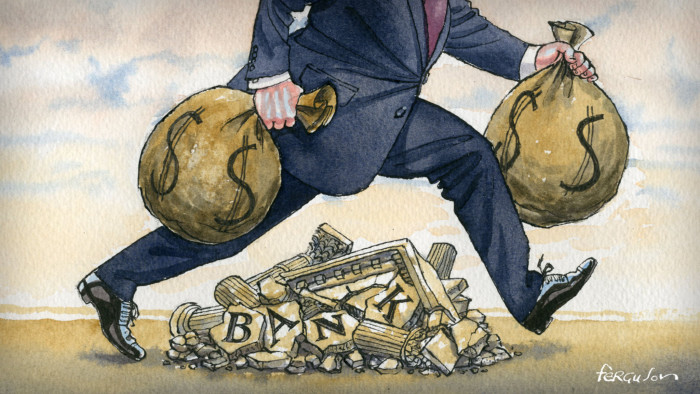Opinion today: What’s changed since the crash?

This article is from today’s FT Opinion email. Sign up to receive a daily digest of the big issues straight to your inbox.
Throughout the 20th century, economic systems have performed a series of reinventions when needed. After the Great Depression, the second world war, and the stagflation of the 1970s, people wanted change and they got it. But what has happened over the decade since the global financial crisis of 2008? Have policymakers and politicians retrenched into the past or sought to move ahead into a different future?
The answer is the former, argues Martin Wolf in his economics column. To be fair, they were trying to return to a better version of the past in terms of financial regulation, but the persistent fealty to so much of the pre-crash conventional wisdom is astonishing. Recovery efforts barely questioned the relative roles of government and markets or the problem of rising inequality. Given this inertia, Martin says, it is not surprising the world has seen a clutch of rising populists. People want a better future, not a better version of the past.
Sarah O’Connor warns that the demise of Wonga will not set workers free from the trap of unstable, poorly-paid jobs. Payday lenders understood quickly that there was a market in employees who are tied to precarious contracts and they will not stop targeting them.
Andrew Hill applauds Nike’s choice of American football player Colin Kaepernick as the face of a new ad campaign. The quarterback, whose high-profile protests against racism and police brutality in the US drew the wrath of president Donald Trump, is an overtly political figurehead.
General Keith Alexander worries that we are at, or very nearly at, war in cyber space today. A transatlantic alliance will be vital if Europe and the US are to have any hope of protecting themselves, says the former director of the US National Security Agency.
What you’ve been saying
‘Populism’ has become a term of contempt: letter from Nikos Kaloyeropoulos, London W8, UK
Philip Stephens provides an honest analysis of the financial crisis, and the unequal burden sharing of its consequences. However, like many other analysts today, he uses populism as an all-purpose term of contempt towards people who have expressed preferences contrary to the mainstream view. […] Populists in my view are voters who want their elected representatives to be central to a democratic society and to defend and maintain their freedoms, culture, history and identity. Assigning a derogatory meaning to populism will lead to the same treatment of patriotism and further alienation of large segments of society.
In response to Liberals, nationalists and the struggle for Germany, Mantis Toboggan M.D. says:
Another parallel with 1989: then, as now, the ruling government and its allies in the press described anyone opposing its policies as “far-right extremists”.
What a difference 30 minutes can make: from Dr Alexander Anthopoulos, Phoenixville, PA, US
Might I make a modest proposal regarding the debate on whether or not to scrap the ritual of moving clocks forward in the spring and setting them back again in the autumn? Staying on standard time means very early sunrises in summer, while staying on daylight savings time leads to excessively late sunrises in winter. The solution is to compromise and have clocks permanently set 30 minutes ahead of GMT.
Today’s opinion
Budget airline snafus help keep the holiday spirit alive
Savour your memories while on hold to the call centre
Instant Insight: Colin Kaepernick is a shrewd choice for Nike’s new campaign
The NFL quarterback who protested against racism is an overtly political figurehead
Wonga’s demise will not set workers free from the labour trap
Payday lenders did not target the jobless, but low-paid employees in volatile jobs
A transatlantic alliance is crucial in an era of cyberwarfare
Nato holds the seeds of a solution — but time is running out
FT Alphaville: Further reading
Tackling transport congestion will strain rights and freedoms
Transforming travel is core to energy transition — and the most resistant to change
Why so little has changed since the financial crash
Martin Wolf on the power of vested interests in today’s rent-extracting economy
FT View
The FT View: Europe needs a central anti-money laundering body
Danske Bank scandal highlights a gaping hole in financial regulation
The FT View: Capitol Hill tech hearings must focus on algorithms
US senators should probe how the platforms manipulate users
The Big Read
The Big Read: Italy’s bridge disaster: an inquest into privatisation
The populist government wants to renationalise motorways but faces a test in turning its rhetoric into policy
Comments